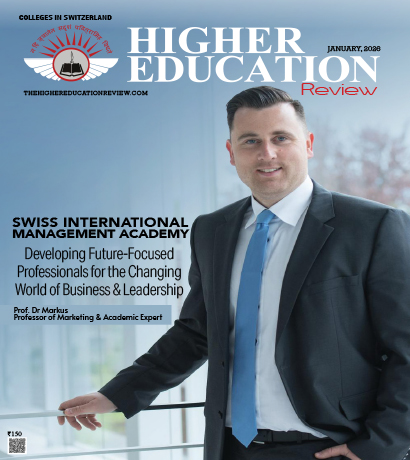The Future of Work: Aligning Higher Education with Industry Needs
 Koneru Satyanarayana, Chancellor, KL Deemed to be University, is a distinguished philanthropist and educational entrepreneur. With over four decades of expertise in educational institutional management and leadership, he brings his invaluable experience to the field. Here, he outlines the future of employment and presents pointers for what must be done by HEIs to cater to the current market demands.
Koneru Satyanarayana, Chancellor, KL Deemed to be University, is a distinguished philanthropist and educational entrepreneur. With over four decades of expertise in educational institutional management and leadership, he brings his invaluable experience to the field. Here, he outlines the future of employment and presents pointers for what must be done by HEIs to cater to the current market demands.
As the world changes rapidly under the influence of technological innovation and automation, the future of work is entering a new dimension. Businesses across sectors have grown at an incredible pace, and the needs of companies have changed the way they do business, leading to changes in the skills needed by employees. Therefore, to be successful in this new era, universities must adapt and align their core content with changes in the economy. According to the World Economic Forum’s Future of Jobs Report 2023, 44% of employee core skills are poised to change in the next five years.
Therefore, to survive, educational institutes must focus on providing students with not only theoretical knowledge but also intellectual and practical knowledge in real life. In addition, they should promote a culture of lifelong learning to ensure graduates are prepared for future workplace challenges. By doing so, higher education institutions can play a vital role in bridging the gap between education and employment, benefiting students and the industries they enter.
Here, let's get into the specifics of how the higher education sector should keep up with evolving needs to close the skills gap and ensure students are job-ready:
Experiential learning: Experiential learning is a fundamental aspect of preparing students for the workforce of the future. In today's world, traditional classroom training simply isn't enough to equip graduates with the practical skills that are required by industry. That's why educational institutions must incorporate real-world experiences into their educational framework, enabling students to apply theoretical knowledge in practical scenarios. This can be achieved through internships, apprenticeships, or hands-on projects that simulate workplace environments. By immersing students in authentic work settings, higher education promotes a seamless transition from academia to the professional realm, ensuring that graduates are well-equipped to excel in their chosen careers.
Skill-centric education: In order to prepare students for the changing demands of the job market, higher education institutions should shift their focus from academic achievements to skill-centric education. Instead of just degrees, employers now value specific skills. Therefore, universities must update their curricula to integrate courses that focus on critical thinking, problem-solving, adaptability, digital literacy, and emerging technologies. This way, students can learn comprehensive knowledge and skills that align with growing workforce needs and benefit their careers in the long run.
Lifelong learning culture: In today's corporate landscape, the commitment to lifelong learning has become increasingly important. Because of the rapid speed of technological advancement, skills can soon become obsolete. To overcome this, educational institutions should support continuous learning initiatives that encourage both students and professionals to pursue continual education throughout their careers. Flexible, modular courses can help graduates maintain their competitiveness and adaptability in an ever-changing employment market. By fostering a culture of lifelong learning, higher education institutions can play a critical role in preparing students for the future of work.
Integration of Emerging Technologies: Higher education institutions should stay abreast of emerging technologies and integrate them into their curricula. Courses on topics like artificial intelligence, blockchain, data science, and cybersecurity can prepare students for the jobs of the future. Additionally, providing access to cutting-edge tools and resources within campus labs or through partnerships with industry players can enhance students' practical skills.
Professional Development for Faculty: Faculty members should receive ongoing professional development opportunities to stay updated on industry trends, teaching methodologies, and technological advancements. Encouraging faculty to engage in industry-related research, attend conferences, and participate in industry internships can enrich their teaching and mentoring abilities.
Career Services and Guidance: Robust career services departments can assist students with career exploration, job search strategies, resume writing, interview preparation, and networking. Offering career counseling, mentorship programs, and alumni networks can further support students' transition from academia to the workforce.
Data-Driven Decision-Making: Utilizing data analytics to track graduates' employment outcomes, gather feedback from employers, and assess the effectiveness of educational programs can inform strategic decision-making and continuous improvement efforts.
Global Perspective and Cultural Competence: Given the increasing globalization of the workforce, higher education institutions should promote global awareness and cultural competence among students. International exchange programs, cross-cultural projects, and language courses can help students develop the skills needed to thrive in diverse work environments.
In a nutshell, the future of work certainly depends on universities' ability to adapt and change. Thus, educational institutions must develop to meet business needs. By aligning the educational practices mentioned above with the demands of the workforce, institutions not only help students succeed in their careers but also create a positive impact on innovation and a good future. Thus, in today's evolving age, as businesses continue to evolve, higher education must serve as a beacon of hope by ensuring graduates are equipped to deal with challenges and future possibilities.

